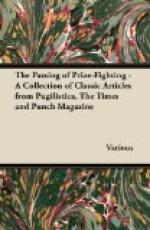Anon I saw thee as the Queen
Who held so many hearts in
fee;
But MARY STUART scarce had been,
Methinks, so beautiful as
thee.
I fain had gone and splintered lance,
As in the old days in our
realm;
To win a kind approving glance,
And wear your glove upon my
helm.
What, stately EDITH! Lives there
yet
The lady of that royal line,
The peerless proud Plantagenet,
Will KENNETH’s great
emprise be mine?
We saw how high his hopes could soar;
We know the guerdon that he
won.
Shall I find favour, as of yore
Did DAVID, Earl of Huntingdon?
’Tis certain, in whatever guise
You come, as heroine of song
Or story, to my faithful eyes
You shine the fairest of the
throng.
However fanciful you be,
Whatever fancy dress befalls;
My fancy paints you fancy-free,
To fancy me at Fancy Balls!
* * * * *
THE REAL NINE POINTS OF THE LAW.—Costs.
* * * * *
THE UNOBSERVED OF ONE “OBSERVER.”
From the account given by “OBSERVER” in the Times, it might be inferred that “HARCOURT! HARCOURT!” was shouted all over the House, in the lobbies, through the smoking-room, in the library, through the cellars, in fact, everywhere within the sacred precincts, on one memorable night, while at that very moment the wily Sir WILLIAM, tucked comfortably up in his little bed, was murmuring softly to himself, “HARCOURT! indeed! ‘Ha! not caught,’ more likely!” and so sweetly fell asleep.
* * * * *
MRS. R. read aloud from the latest Report of “B. and F. Bible Society,” “One cannot help thinking of the glorious field of labour which lies open here before the Colporteur, and of the pleasant way in which his labours are appreciated by all.” But the worthy lady pronounced colporteur as coalporter, and so on hearing from a friend that “the Coalporters were on strike,” Mrs. R. could not help exclaiming, “Dear! how ungrateful of them, when they were being ’so much appreciated by all!’”
* * * * *
[Illustration: THE WESTMINSTER WAX-WORK SHOW FOR THE SESSION 1892. ROOM 2.]
* * * * *
OUR BOOKING-OFFICE.
In Tess of the D’Urbevilles (published by Messrs. OSGOOD, MCILVAINE & CO.), Mr. THOMAS HARDY has given us a striking work of fiction, bold in design, and elaborate in finish. The characters, with one exception, are as true to life as are his graphic descriptions of nature’s own scenery; true that is to the types of such rural life as he professes to represent,—the life led in our Christian country by thousands and thousands of genuine Pagans, superstitious Boeotians, with whom the schoolmaster can do but little, and the parson still less. As to the clergymen who appear in this story, two of them are priggishly academic, a third is a comfortable antiquarian, and the fourth unacquainted with even the A.B.C. of his own pastoral theology.




